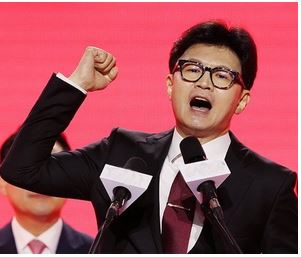
Seoul, July 23 (IANS) Han Dong-hoon, a former interim leader of the ruling People Power Party (PPP), was elected as new head of the embattled party without a runoff Tuesday as he won a majority of votes in the heated race.
Han won a whopping 62.8 per cent of the vote against runner-up former Land Minister Won Hee-ryong’s 18.8 per cent. Five-term lawmakers Representative Na Kyung-won and Representative Yoon Sang-hyun won 14.6 per cent and 3.7 per cent, respectively, Yonhap news agency reported.
Han’s win with a majority of the vote makes a runoff unnecessary.
President Yoon Suk Yeol showed up at the national convention held at the KINTEX exhibition center in Goyang, northwest of Seoul, for the second consecutive year. Last year marked the first time in seven years that the president had attended a national convention of the ruling party since former President Park Geun-hye did so in 2016.
During the convention, Yoon stressed the need for unity between the government and the PPP to push forward major agenda items despite challenges from the opposition-controlled National Assembly.
“The large opposition party is ignoring urgent livelihood issues and pressing economic policies, instead focusing on political strife. Although the 22nd National Assembly began two months ago, it effectively remains idle,” Yoon said in an address. “To overcome the situation, we need unified strength.”
The DP, which has a controlling majority of 170 seats in the 300-member Assembly, railroaded a contentious bill mandating a special counsel investigation into the military’s response to a Marine’s death, which was once again vetoed by Yoon earlier this month.
Tuesday’s election will fill a seven-month vacuum in the PPP’s formal leadership since Kim Gi-hyeon stepped down in December 2023. The ruling party has been led by an emergency committee since August 2022 after former party chairman Lee Jun-seok was removed as leader.
The PPP earlier revised its party rules to include public opinion polls in the election based on a weight of 20 per cent public opinion poll results and 80 per cent ballots cast by party members as part of efforts to better reflect public views after its bitter defeat in April.
Recent Random Post:



















